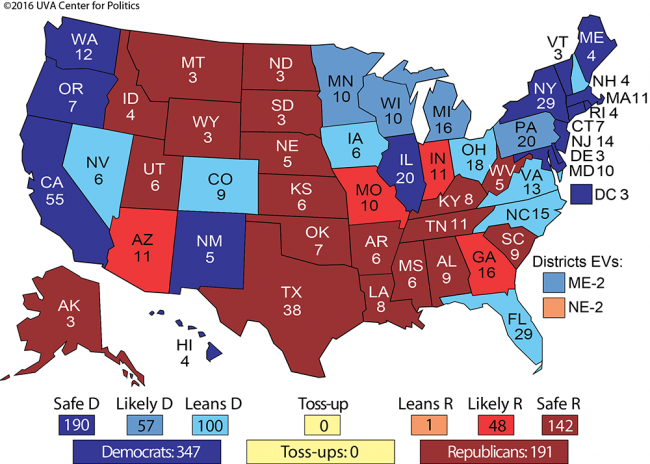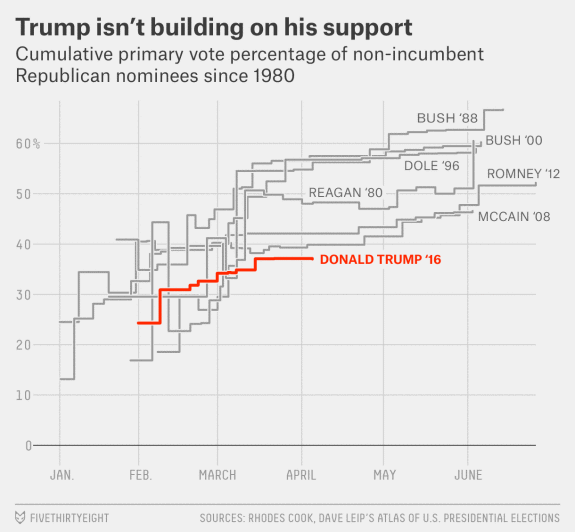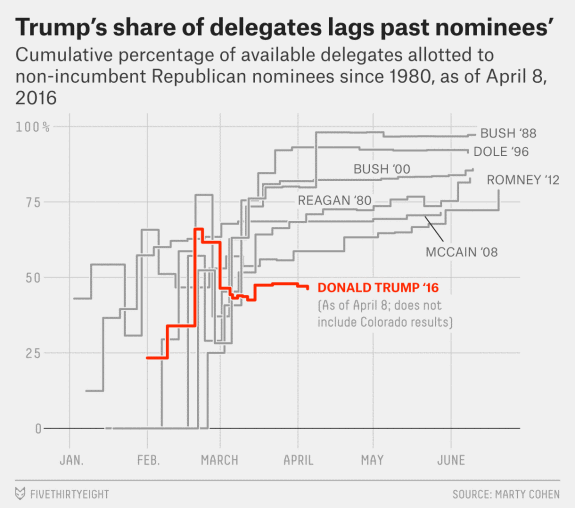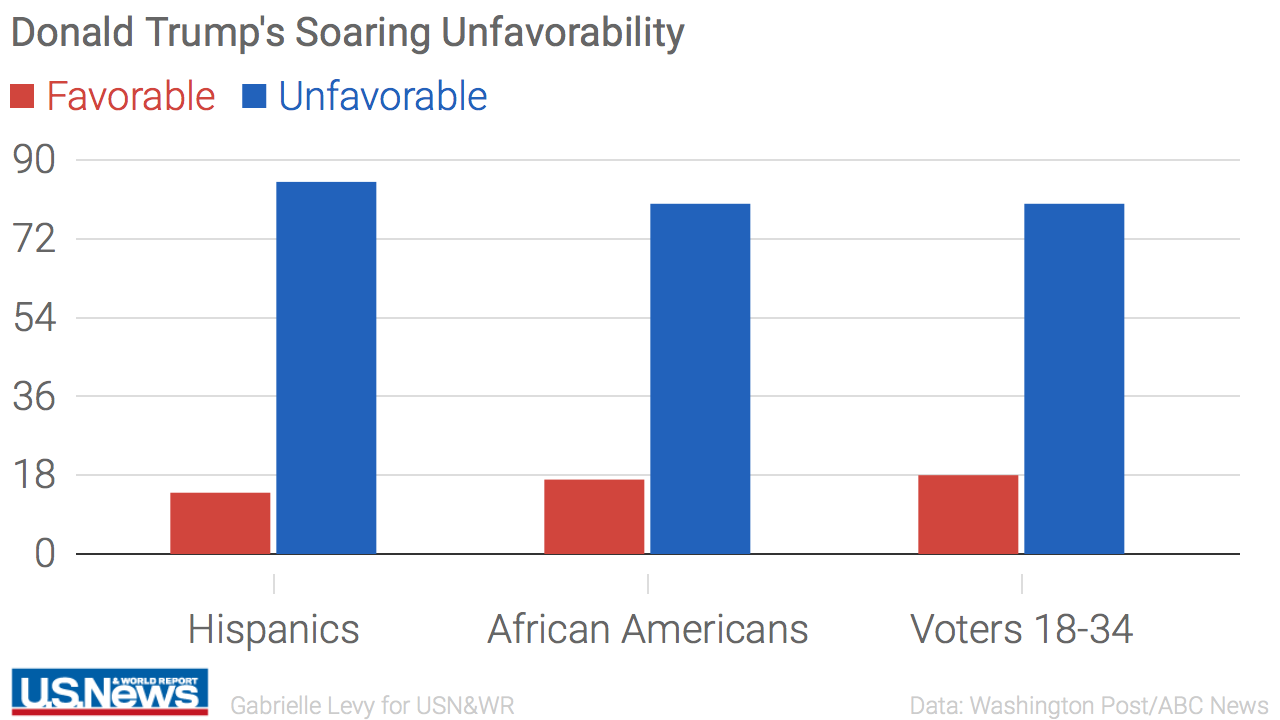Good news for Donald Trump, his supporters, conservative bloggers who support him and the talk show hosts who support him or are edging towards supporting him on the grounds that assumed Democratic Party Presidential nominee Hillary Clinton must at all costs be stopped from winning the Oval Office seat. Donald Trump has indeed gotten more votes than any other GOP candidate this year and is indeed ahead on delegates.
Bad news: he isn’t building on his support at all and is the weakest GOP front-runner of the modern era. Five Thirty Eight notes:
This is the seventh Republican primary in the modern era (beginning in 1972) without an incumbent president in the race; here’s the cumulative vote percentage that each eventual nominee received over the course of the primary season in those seven campaigns:
Past GOP nominees such as George H.W. Bush in 1988, George W. Bush in 2000, Bob Dole in 1996 and Ronald Reagan in 1980 had bigger shares of the vote at this point, even if they started out slowly. You’ll also note, however, that the two most recent Republican nominees, John McCain and Mitt Romney, weren’t doing too much better than Trump is now.McCain and Romney, though, were far ahead of Trump at this point in the delegate race. All the eventual nominees studied here won a majority of the delegates allotted1 by this date. Trump remains short of a majority.
The analysis points out that this doesn’t mean in the end Trump won’t wind up with a bigger share, but here is the fact:
Unless something radically changes, Trump will finish the primary season with the lowest percentage of the primary vote and the lowest share of delegates of any Republican presidential primary vote leader since caucuses and primaries became the main method for selecting nominees.
Basically, if the GOP’s problem is expanding its tent and winning over people not in its existing choir, Trump is facing the same problem within the GOP and the electorate. Part of the problem is the candidate himself, who’s style of campaigning has brought idea-content political discussion to a new low in our history. His rhetoric against opponents continues to be overheated and demonizing. Another part of the problem is that many of his most visible spokespeople, political aides, or followers at rallies seem to many Americans not in his tent or choir as extremists who actually pose a threat to the American political system. (Andrew Sullivan is not alone in his view at this point).
He is doing very poorly in national polls. Like this one:
Despite leading his Republican challengers in national polls, Donald Trump’s sky-high unfavorability is shaping up to be a major problem for the GOP presidential front-runner, should he seize the party’s nomination and run in the general election.
A Washington Post/ABC News poll this month finds that while Democratic-leaning groups like minorities and young people deeply dislike the billionaire businessman, his favorability poll numbers are underwater among voters that make up the Republican base.
The poll finds 67 percent of overall voters surveyed have an unfavorable opinion of Trump, compared to just 30 percent who say they have a favorable impression of the billionaire businessman.
Roughly similar numbers of independent voters and white women voters, dislike Trump, both groups that went for Mitt Romney over President Barack Obama in 2012.
And his popularity in general is election-victory-challenged:
And then there’s this:

Even worse news, is this projection of what could be the electoral college outcome if Trump faces Clinton. It’s by the University of Virginia’s Larry Sabato, the most precise analyst and election forecaster in America. It shows a potential blowout:

Some of Trump’s more thoughtful supporters and defenders can make a logical case for him and for the party not seeking to deny him the nomination. For instance, there is a must-read-in-full piece in Fordham Political Review written by Trump supporter Joe Iorio. Here are a few chunks of it:
Trump seems to have the perfect recipe to win the nomination — playing off the political disenfranchisement and frustration felt by 44 percent of voters across party lines. Trump channels the anger that many blue-collar Americans, some of his most ardent supporters, feel towards Washington and the president, and he vehemently expresses this sentiment in his rhetoric. In simple terms, he dislikes President Obama, thinks Washington is underachieving, loves America, and wants to “make [it] great again.”
The fundamental appeal to these sentiments is exactly how the Cruz and Trump campaigns are fueled…..
And:
While Donald Trump did not coin the term “silent majority,” it has a rich history that dates back to President Nixon’s administration. However, this broad yet dynamic term has evolved since Richard Nixon’s use during the Vietnam War. Perhaps, for the current election it is appropriate to characterize its significance as a state of mind — a feeling of maltreatment or exploitation. In turn, without warning or explanation, this disposition surfaced in a time with great opportunity for sweeping change. Since becoming their voice, Trump has reinvigorated this “majority” and received significant support.
Therefore, I caution anyone that discounts Donald Trump or the movement behind his campaign. As an intelligent businessman and cogent leader, Trump is significantly more calculated than others may realize. He understands what it takes to win the nomination and has executed his campaign strategy accordingly. He can no longer be underestimated.
In the past weeks, much has been said about Donald Trump’s imminent path to winning the nomination….
And:
To look at this situation from afar, Republicans must realize that a Donald Trump White House is exponentially better than a Hillary Clinton one. In order to win this critical election, the goal should be to set aside our ideological differences and political hardships to focus on a common goal: beating Clinton. One could argue, based on preliminary polls, that Kasich or Cruz would best serve to combat Hillary Clinton. However, with 60 percent of Americans believing that our government needs “very major reform,” our party must listen to the people in hearing their cry for political change. The status quo is no longer satisfying the majority of the constituents and that is evident in their support of Donald Trump.
And so, I challenge others to respect and embrace the importance of this movement. I also challenge our politicians to examine what led us to this point. Anyone who fails to recognize or abide by the consequence of these indicators is doing themselves, the Republican Party, and the U.S. a great injustice. Unfortunately, however, with the current political landscape, I’m not too optimistic the establishment will identify and accept the responsibility of these failures.
Read it in full.
However, the political bottom line is that neither party expected 2016 to be a cakewalk. But if Trump is the nominee, the GOP could find itself mired in a tar-pit.
Joe Gandelman is a former fulltime journalist who freelanced in India, Spain, Bangladesh and Cypress writing for publications such as the Christian Science Monitor and Newsweek. He also did radio reports from Madrid for NPR’s All Things Considered. He has worked on two U.S. newspapers and quit the news biz in 1990 to go into entertainment. He also has written for The Week and several online publications, did a column for Cagle Cartoons Syndicate and has appeared on CNN.




















